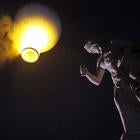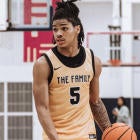Update: A "late-night summit" between some Minnesota players and school officials did not provide any indication that the players' boycott of football activities would end in time for the Gophers to play in the upcoming Holiday Bowl, according to the Star Tribune. Joe Christensen reports that the school must "decide by noon Saturday" whether it will play in the game or force the bowl to choose a replacement team to face Washington State on Dec. 27 in San Diego.
Minnesota players were joined by school president Eric Kaler (who was not initially invited), athletic director Mark Coyle and other school leaders in a meeting on campus, according to Christensen.
The Gophers have been boycotting football activities and threatening not to play in the Holiday Bowl until 10 players suspended by the school for their alleged role in a sexual assault are reinstated. Christensen reports that players in attendance at the meeting hoped to at least "have the hearings for the 10 suspended players moved up from January to early next week ... but that goal wasn't reached on Friday night" either.
Should Minnesota forgo the bowl game, Northern Illinois is next in line to play in the game due to its APR score. Dennis Dodd of CBS Sports reported earlier Friday that the entire Holiday Bowl would be in jeopardy if a decision was not made by early next week as to whether the Gophers would play in the game. This would be due to time constraints for a team to have enough time to gather and practice ahead of the game. Should NIU choose not to play in the game, Cal and Arizona State would be next up. Both Pac-12 schools lost to Washington State during the regular season.
Original story
Minnesota's trip to the Holiday Bowl is in jeopardy. But in the big picture, a few extra bowl practices, another game and a few million dollars are all small potatoes compared to the cultural fracture growing between the football players and the university's administration.
Minnesota players announced they were boycotting all football activities, including the bowl game if necessary, over the suspension of 10 players related to a sexual assault investigation. In response to the boycott, university president Eric Kaler issued a statement Friday in which he remained firm on his decision even in the face of the players' threats of not playing.
I have heard the call from members of our football team to boycott the Holiday Bowl. Athletics Director Coyle and I have offered, through members of the coaching staff, to meet with the players today to discuss their concerns, but the players have thus far declined that offer. This offer remains open, as we'd like to sit down with these student-athletes and answer any questions that we are legally permitted to address. It is important that they understand our commitment to the University's values, and why any Athletics Department decision is different from any conduct code and is different from the decisions made in the criminal justice system.
Kaler cited the school's "institutional values" as the chief reason for his stance, noting they were "far more important than any football game."
That might be the understatement of the year, as the Minneapolis Star Tribune reported Friday evening that an underage recruit was also part of the alleged incident on Sept. 2. The alleged victim stated, via court documents, that the "recruit and at least a dozen other men raped her."
Still, the impasse between Kaler, who backs the athletic department's decision, and the players, who have been publicly supported by coach Tracy Claeys, has created a layered story in which social issues like sexual assault have become intertwined with athletic issues like the ever-growing voice of the student-athlete.
There's a lot to unpack, so here are the key points to know.
1. Many have called for college athletes to have a greater voice, but did they anticipate this? It wasn't just that Minnesota players took a stance on the suspensions, it's how they took it. Senior wide receiver Drew Wolitarsky said, "The boycott will remain in effect until due process is followed and the suspensions for all 10 players involved are lifted." When asked about the possibility of losing scholarships over the protest, Wolitarsky added, "We're all in this together. What are they going to do, pull 120 guys off the team? They won't have a team if that's the case."
Five years ago, it would have been hard to fathom a player making that type of statement. Times have changed. College athletes still don't have a huge voice, but it is bigger than ever before. But when we think about athletes using that voice, it's usually been connected to tangible things to which they are entitled. The Ed O'Bannon class-action lawsuit and the Northwestern unionization push were two such examples. However, here is a situation in which a group of players came together for a cause related to a more sensitive legal issue. And they could throw a wrench -- potentially far-reaching -- into bowl preparation and the makeup of the team because of it. Many people got behind the activist movement of player rights, but did they anticipate this type of stance being born from it?
2. The sexual assault case at the center of this story isn't over: It's been a little over three months since the female accuser, a member of the Minnesota gameday operations staff, says she was assaulted. Cornerbacks KiAnte Hardin and Ray Buford, safety Dior Johnson and defensive end Tamarion Johnson were suspended for three games in-season when their names were connected to the investigation, but they were later reinstated and no arrests were made nor charges filed. A restraining order placed against those players, along with running back Carlton Djam, was dropped in November.
The suspension of those players plus the five others, whose connections to the alleged incident are unknown, came from an investigation by the university's Office of Equal Opportunity and Affirmative Action. While there have been no arrests or charges, the athletic department doesn't need such grounds to suspend players. Due process of the law doesn't mean a player can't be separated from the team until their legal issue is resolved.
It's true that reputations are at stake, but so is the truth. Accounts of exactly what happened differ and an eight-second video clip of the woman taken by Djam in which she "appears lucid, alert, somewhat playful and fully conscious" still doesn't tell us much.
3. The branches on the story could be long, too: This story isn't going away. After Kaler's statement was released, the Star-Tribune reported that an underage football recruit was allegedly involved in the incident.
At one point, Djam used his phone to videotape the woman and the recruit having sex, according to the police report. Later, Djam sent a message to another player, Ray Buford, that he and the recruit had sex with the woman, the report states. According to the EOAA report, several text messages that night indicated that the recruit and one of the players planned to "double team" the alleged victim.
The unnamed recruit acknowledged having sex with the woman but denied raping her. Minnesota told the paper the recruit's "involvement was not reported to either the NCAA or the Big Ten because the school does not believe that a rule violation occurred."
4. Plus, there's some bad history at Minnesota: If there are any questions as to why Minnesota feels the way it does about this story, look no further than its recent history with sexual assault allegations. Last year, multiple football players were accused of sexual assault and athletic director Norwood Teague resigned amid sexual harassment claims. Sexual harassment and assault are widespread issues not limited to Minnesota, but the university has had a recent string of high-profile issues. Their stance on this alleged incident is undoubtedly shaped by what happened a year ago.

















